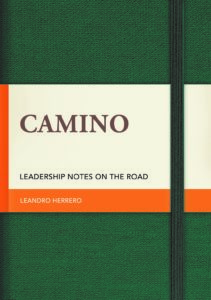MY NEW BOOK – CAMINO: LEADERSHIP NOTES ON THE ROAD, AVAILABLE TO PRE-ORDER
A Daily Thought featured in Camino:
It should not surprise us that people are constantly looking for the magic bullet of leadership. What makes a good leader? We are not short of answers. Reams of paper and servers full of gigabytes will give you any answer you wish. There is, for example, the typical list of values: integrity, courage, honesty, sensitivity, emotional and social intelligence etc. Trouble is, these lists of universal values are not very specific. They would apply equally well to being a good father, indeed to being a good human being.
I am sympathetic to the approach that asks a more refined question: ‘What would it take to be a leader here, in company A,B,C?’ Still you wish you could find the universal magic bullet, even if with lots of translations and context.
But thanks to Google, we are a step closer to the bullet, or at least to understanding the potential magic. The data is interesting. It answers the question for Google and leaves us with a big hypothesis: could we extrapolate this to our own non-Google-esque environments?
The reason why Google ‘has the answer’, is because a long time ago, Google decided to apply to their Human Resources the same rigour applied to their engineering. That is, using something Google has in good supply: data. Google is not shy to say that it is carrying out it’s own People Analytics all the time.
Consistently, through their internal analytics, Google finds that the single characteristic of the successful leader is ‘predictability’. Not very exciting, in fact, somewhat of an anti-climax at a first reading. It means that people in Google feel that their (good) leaders are those who will not interfere or change their mind all the time. They will be consistent. That leads them to talk about the other side of the magic bullet: autonomy. People feel with this that, within some parameters, they are free to act, make the most of themselves, and be themselves. The predictable, consistent leader removes the main obstacle: himself or herself. From here, it follows that, another way they describe this singular characteristic of leadership is ‘autonomy support’. Summary: the best Google leaders are consistent, therefore predictable. That gives autonomy to me, to make the best of me. They support my autonomy. Nice Human Algorithm.
The data is solid. No other parameters, from IQ to university grades or mental capacity correlate with ‘good leadership’. I don’t know how Google-esque we all are these days but the ‘Google evidence’ is a clear reinforcement of the concept I have used formally since 2006, ‘Backstage Leadership™’: the art of leaders giving the stage to others who can act. In the case of Viral Change ™, the ‘others’ are those elected volunteers, highly connected and influential individuals within the organisation. Outside the Viral Change™ framework, they are subordinates, team members or other colleagues.
This idea is also consistent with an old obsession of mine: space. That is, that leadership should be concerned with the creation and protection of space both for themselves and for others. That this all closes the loop nicely on my own thinking is irrelevant here. What it does say however, is that at the very least, this is a hypothesis worth testing in your organization.
If, as I see it, a mature version of leadership is actually to back off, as opposed to stepping in, then this has significant implications for leadership development. The single objection I get about my Backstage Leadership ™ is people saying, ‘If I do that, it will be a disaster, my people won’t deliver’. If this is the case, you have a problem. It’s called you! Either you are in full command and control mode, so the problem is you, or you don’t have the right people. If the latter, the problem is still you, unless you have inherited a colony of aliens.
______________________________________________________________________________________________
CAMINO – LEADERSHIP NOTES ON THE ROAD, AVAILABLE TO PRE-ORDER NOW!
An extensive collection of my Daily Thoughts on leadership. Camino, the Spanish for road, or way, reflects on leadership as a praxis that continuously evolves. Nobody is ever a leader. Becoming one is the real quest. But we never reach the destination. Our character is constantly shaped by places and journeys, encounters and experiences. The only real theory of leadership is travelling. The only footprints, our actions. The only test, what we leave behind.
To read downloadable extracts visit the Camino website




Would you like to comment?